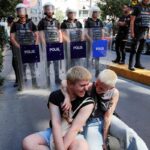DAVAO CITY (MindaNews / 25 June) — A Davao City-based environmental group has revived calls for the passage of a Local Green Building Ordinance, a measure that will promote the use of eco-friendly designs and materials on infrastructures to combat the rising urban heat index.
Lemuel Manao, program coordinator of the Interfacing Development Interventions for Sustainability (IDIS), said on Sunday that a similar legislation was proposed by then Councilor Diosdado Angelo R. Mahipus Sr. in 2018 but it failed to get the approval of the local council because it might only duplicate the existing National Green Building Code.
He said the group is lobbying again for the local ordinance to compel small-scale establishments to comply with greening requirements as the national legislation covers large projects and establishments like shopping malls and schools.
During the “Turning Down the Heat: A Research Forum on Urban Heat Island (UHI) Effect Assessment of Public Spaces in Davao City through Citizen Science”at the People’s Park Activity Area last Friday, Manalo said the group listed down some of the recommendations that could be added into the proposed local legislation as he emphasized the need to adopt more sustainable approach to development.
Based on the “Comparative Study on Urban Island (UHI) Effect in Green-Built Spaces in Davao City”, IDIS environmental research officer Justin Joshua Pungyan said that in the city, urban heat is relatively higher around commercial, downtown, and urban residential areas as compared with areas with sufficient tree covers.
The study was conducted in various areas such as Clifford Park, Marfori Botanical Park, and C.M. Recto Avenue in Poblacion District, Dacudao Avenue and Marfori Soriano Flyover in Agdao District, and Matina Linear Park in Talomo District from April 2022 to April 2023.
“If we are in cities without trees, temperatures would really go up. But tree shaded surfaces are relatively cooler. This what we aim,” he said.
Manalo said that IDIS would explore more specific recommendations, particularly ventilation and insulation, renewable energy and natural light, permeable pavement, green roof and decking, indoor comfort, surface and vertical greening, rainwater capture and sustainable drainage, and public waiting shed.
He said permeable pavements considered as a low-heat material, for instance, could lower down temperatures when used in parking spaces or main roads, instead of the conventional concrete pavement.
“There is a major difference when it comes to temperature readings when we use permeable pavements for parking spaces. Permeable pavement is not yet used along main roads. But there are technologies that are compatible for use along main roads, especially the ones being used in Kuala Lumpur and Singapore,” he said.
He said there are methods that can be adopted to minimize the use of air-conditioning units, such as building designs that allow more airflows, landscaping to increase indoor comfort, and making use of plants, among others, to keep the climate inside buildings relatively cooler.
He said the group hopes to sit down with policymakers to discuss the proposal.
Manalo said the IDIS recommends, among others, utilizing heat as a resource for solar power, incorporating nature-based solutions and low-impact development in all materials and designs, use of low-impact materials such as permeable paving systems for roads and pedestrian walkways, and parks.
He said the group also suggests decentralizing central business district, increasing urban forest cover, preservation and management of blue spaces like ponds, built and natural waterways, increasing and protecting trees lining the roads, increasing public waiting sheds for public transport, and creating an open space network plan. (Antonio L. Colina IV / MindaNews)



